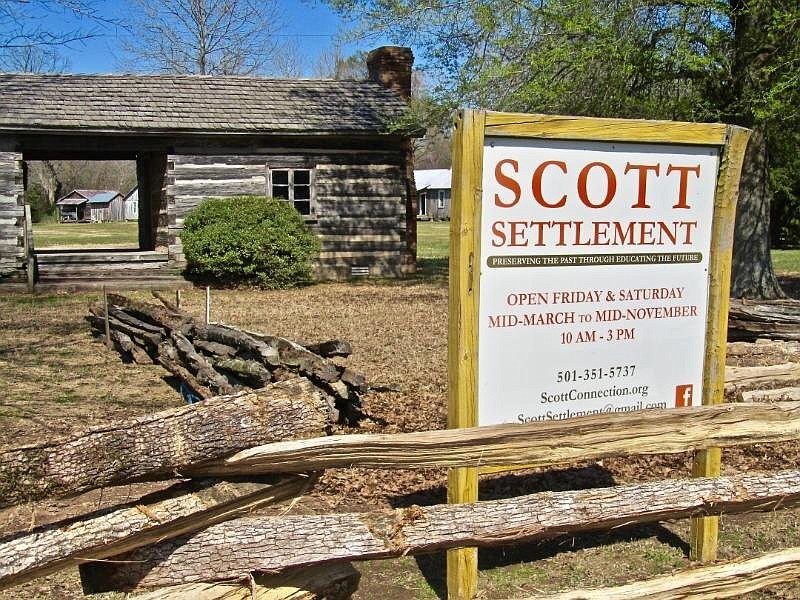SCOTT — It has been many decades since a passenger train stopped at the former Cotton Belt depot now seen at one corner of Scott Plantation Settlement, about 15 miles east of Little Rock. These days, the tickets sold at the hip-roofed station buy a walk rather than a ride.
The stroll is hosted by knowledgeable guides like Linda Goza, who show visitors some of the historical settlement's 25 structures. The setting evokes the hardscrabble lives of nearby rural residents in the century-plus from Arkansas statehood to World War II.
Scott Plantation Settlement was created a quarter-century ago by the nonprofit group Scott Connections. One of the founders, Betty Ruth Dortch Russell McMath, told an Arkansas Democrat-Gazette reporter in 1999 about "the old farming way of life that we grew up in."
McMath, who died in 2019 at age 99, described each plantation as "like a little town with its own barns, farm equipment, cotton gin, tenant houses, blacksmith shop, school, a cistern, pecan orchard, gardens and so on. All the necessities were attended to right there on the property. If you needed a building, you cut down the trees and built it right there."
Goza offers anecdotes and insights on some of those residents as she takes visitors inside buildings described by McMath. Most of the structures were taken apart at other locations and moved here for reassembling, while a few were built from scratch as replicas.
The walking tour stops at some of the initial dozen buildings moved here in 1999: three tenant houses representing different styles, a cotton pen, a blacksmith shop, a corn crib, a dogtrot house, a medical clinic, an outhouse, a smokehouse, a wash house and the original W.P. Dortch Sr. dwelling known as "the big house."
Properties added over the years along with the depot include a one-room plantation school, a plantation office, a commissary, a bell and tower, a cook's house, a sorghum mill, an ice house and a children's house.
The walls of a four-room tenant house are covered with pages of old newspapers. Guide Goza explains that the newsprint served as insulation from cold and wind. The house was built on pedestals to allow circulation beneath while giving chickens room to feed on the termite population. A photograph shows tenant Alex Thomas, known as "Short Man" because of his diminutive stature.
A posting on the Arkansas State Parks website aims to convey the settlement's mystique:
"Some people — in particular, children — see a portal to another world, fascinating in its foreignness, yet somehow familiar. It's easy to forget while you're holding an iPad that not so long ago, homework was completed on a slate with a piece of chalk. Hold that slate in your hands, feel how its size and shape are so similar to today's counterpart, and the connection to the past is immediate.
"It's this visceral experience of history that makes the settlement feel like a playground. These aren't just empty buildings. You're walking into what it would look like before rural electricity came in. It's a way for kids to experience how difficult life was."
A half-mile to the south, another historical attraction makes a fitting complement to Scott Plantation Settlement. The Plantation Agriculture Museum, a unit of the Arkansas State Parks system, preserves the state's farming history in a series of buildings.
Exhibits in the museum's main building, erected in 1912 as a general store, include a miniature cotton gin and a display explaining the importance of mules to farming before the advent of tractors. Two other structures are the Dortch Gin Exhibit, housing a 1916 cotton gin, and Seed Warehouse No. 5, listed on the National Register of Historic Places.
Scott Plantation Settlement
- Address: 15525 Alexander Road, Scott
- Hours: 10 a.m.-3 p.m. Friday-Saturday through Nov. 12.
- Admission: Guided tours cost $5; children under 6 enter free. Large groups are asked to arrange a tour in advance.
- Information: Visit scottsettlement.com or call (501) 351-5737.
- For information on the Plantation Agriculture Museum, visit arkansasstateparks.com or visit (501) 961-1409.
